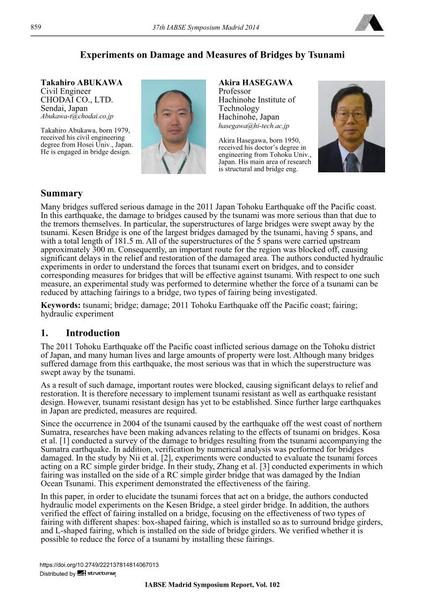Experiments on Damage and Measures of Bridges by Tsunami

|
|
|||||||||||
Bibliographic Details
| Author(s): |
Takahiro Abukawa
Akira Hasegawa |
||||
|---|---|---|---|---|---|
| Medium: | conference paper | ||||
| Language(s): | English | ||||
| Conference: | IABSE Symposium: Engineering for Progress, Nature and People, Madrid, Spain, 3-5 September 2014 | ||||
| Published in: | IABSE Symposium Madrid 2014 | ||||
|
|||||
| Page(s): | 859-866 | ||||
| Total no. of pages: | 8 | ||||
| Year: | 2014 | ||||
| DOI: | 10.2749/222137814814067013 | ||||
| Abstract: |
Many bridges suffered serious damage in the 2011 Japan Tohoku Earthquake off the Pacific coast. In this earthquake, the damage to bridges caused by the tsunami was more serious than that due to the tremors themselves. In particular, the superstructures of large bridges were swept away by the tsunami. Kesen Bridge is one of the largest bridges damaged by the tsunami, having 5 spans, and with a total length of 181.5 m. All of the superstructures of the 5 spans were carried upstream approximately 300 m. Consequently, an important route for the region was blocked off, causing significant delays in the relief and restoration of the damaged area. The authors conducted hydraulic experiments in order to understand the forces that tsunami exert on bridges, and to consider corresponding measures for bridges that will be effective against tsunami. With respect to one such measure, an experimental study was performed to determine whether the force of a tsunami can be reduced by attaching fairings to a bridge, two types of fairing being investigated. |
||||
| Keywords: |
bridge damage tsunami fairing 2011 Tohoku Earthquake off the Pacific coast hydraulic experiment
|
||||
